Resident Spotlight: Farm life was never dull for Homeland resident Theodora Howarth
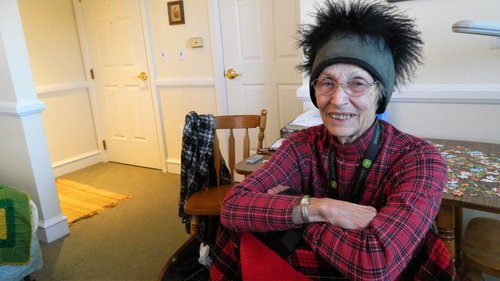
Farm life was never dull for Homeland Resident Theodora Howarth
Theodora Howarth lived a good life, growing up on a farm in New Jersey. The work was endless, but, “somebody has to get those eggs from those chickens.”
“You can’t stop, because if you did, you lost everything,” the Homeland Center resident recalls. “We had a good time. We worked hard.”
And if the pregnant cat was suddenly skinny, the kids knew what to do.
“We’d go up in the hayloft and hunt for baby kittens,” she says. Sometimes, a kitten would become a pet, but others would stay in the barn, hunting for mice.
“They have to do their share,” says Theodora, who has gone by “Teddy” since childhood. “They work just as hard as we do.”
The farm in central New Jersey, near East Brunswick, had long been in Teddy’s family, worked by her grandparents and great-grandparents. It was a full-scale operation, with chickens, cows, and crops. She and her sister pitched in.
Picking strawberries was hard work, crawling between the rows on a hunt for each berry. When the corn was ripe at the large farm of her mother’s parents, “you better get out in that field and pull the corn out and run it to market, because you can’t just let it sit.” She was once milking a cow when the cow “picked up her foot and put it right in that bucket.” Sometimes, the kids would “run like crazy” from roosters “who would chase you and try to peck you. Those roosters were nasty.”
But there were fun excursions, too – sneaking into a swimming hole, or grabbing buckets to gather huckleberries and blueberries growing wild in the woods.
“They make a wonderful pie,” she says. “We were good at making pie. There was all this stuff hanging around, and you end up making jelly.”
The eating was always good, including summer corn. They would go in the cornfield, picking cobs right off the stalk, while someone stayed inside keeping the fire hot under a pot of boiling water.
“It tastes so much better than something that you buy, because you pick it and eat it the same day,” she says.
Her first name came from her grandmother on her father’s side, pronounced “Tay-o-dor-a” in its native Polish. Ask her maiden name, and she rattles it off with ease.
“J-E-N-U-S-Z-K-I-E-W-I-C-Z,” she says. “That’s it. I still remember it!”
Her husband was at first only a friend, one of the gang. He was a machinist who went to work in East Brunswick. They raised five children, and today, Teddy’s sunny room at Homeland is adorned with photos of grandkids.
At Homeland, “everybody is so nice,” she says. “It’s quiet. You can do what you pretty much want to do.”
There’s no television in her room. She spends her time reading mysteries, doing crossword puzzles, and attending Homeland activities, including exercise classes. She is known for the striking, but very warm, spiked hat she wears in the winter – a gift from a Vermonter friend.
“You should have seen the looks I got the first two months I wore it,” she says.
Growing up on that busy farm, there wasn’t much time for school activities, but Teddy was never isolated. She remembers how families watched out for one another, getting together to share lessons learned and pitching in whenever anyone needed aid.
“Everybody watched out for one another,” she says. “Everyone helps the other one. You help one another. That’s what it’s all about.”

 Joanna Kasian found a new life in America!
Joanna Kasian found a new life in America! When that factory closed, she found work an hour away, providing direct care for residents at a New Jersey home for adults with developmental delays and disabilities. She worked different shifts, helping feed and bathe the residents, sometimes changing a diaper or cleaning a soiled bed.
When that factory closed, she found work an hour away, providing direct care for residents at a New Jersey home for adults with developmental delays and disabilities. She worked different shifts, helping feed and bathe the residents, sometimes changing a diaper or cleaning a soiled bed. Gloria Walters and her sister make the most of Homeland.
Gloria Walters and her sister make the most of Homeland. When asked what she likes about Homeland, Gloria, who previously served on Homeland Center’s Board of Managers, has a succinct answer: “Everything!”
When asked what she likes about Homeland, Gloria, who previously served on Homeland Center’s Board of Managers, has a succinct answer: “Everything!”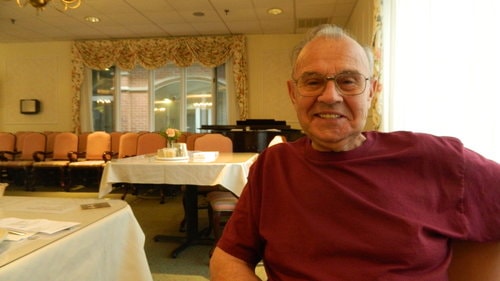
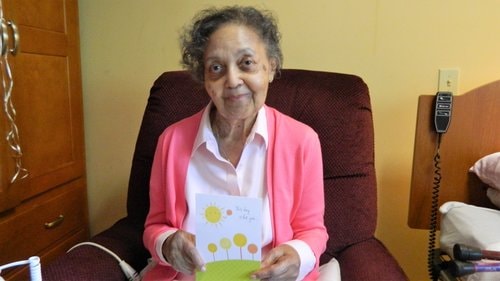 Mary Graves brings joy with flowers and cakes!
Mary Graves brings joy with flowers and cakes!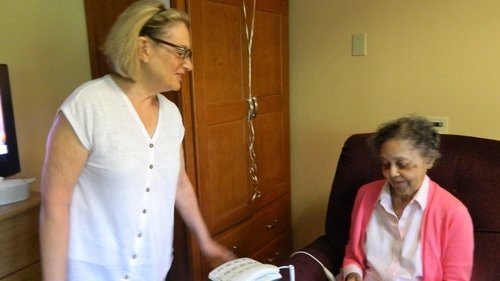 Even for her 85th birthday, celebrated at Homeland, Mary’s daughter-in-law made the special cake for family and friends to enjoy.
Even for her 85th birthday, celebrated at Homeland, Mary’s daughter-in-law made the special cake for family and friends to enjoy.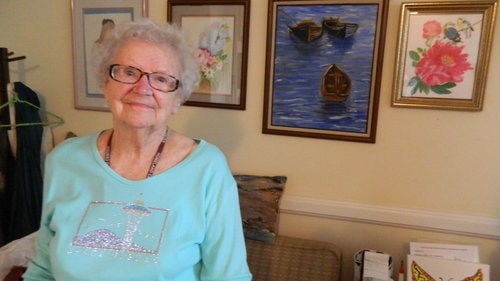 Betty Wise enjoys sharing her paintings with family and friends, but there is one painting she will never give away. It’s her first, a view of rowboats on a shimmering blue ocean. She copied from a picture in a book and after she had finished, Betty’s art teacher said, “You’re going to be a painter.”
Betty Wise enjoys sharing her paintings with family and friends, but there is one painting she will never give away. It’s her first, a view of rowboats on a shimmering blue ocean. She copied from a picture in a book and after she had finished, Betty’s art teacher said, “You’re going to be a painter.”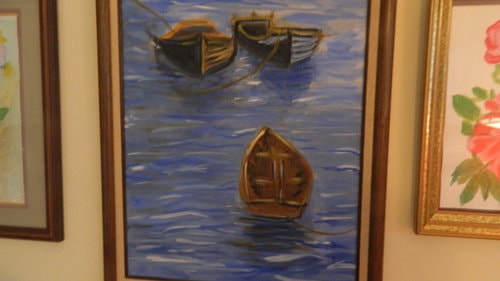 Betty discovered her artistic side when she was in Delaware, where she and Pat would go crabbing and fishing for 15 years after they retired. She met an art teacher who invited Betty to join a class, where Betty produced the boat painting that still hangs on the wall in her Homeland personal care suite.
Betty discovered her artistic side when she was in Delaware, where she and Pat would go crabbing and fishing for 15 years after they retired. She met an art teacher who invited Betty to join a class, where Betty produced the boat painting that still hangs on the wall in her Homeland personal care suite. of big flower that Betty wanted to paint.
of big flower that Betty wanted to paint.
